Text
Learning a language that doesn’t use the same writing system as your native one is so fun because they change the font and you’re doomed
81K notes
·
View notes
Text
In Depth Body Vocab [pt. 3]
A lot of people liked PART TWO a lot! Thank you for all your kind comments and praise! PART THREE will cover the skin and necessary vocabulary underneath. Enjoy <3
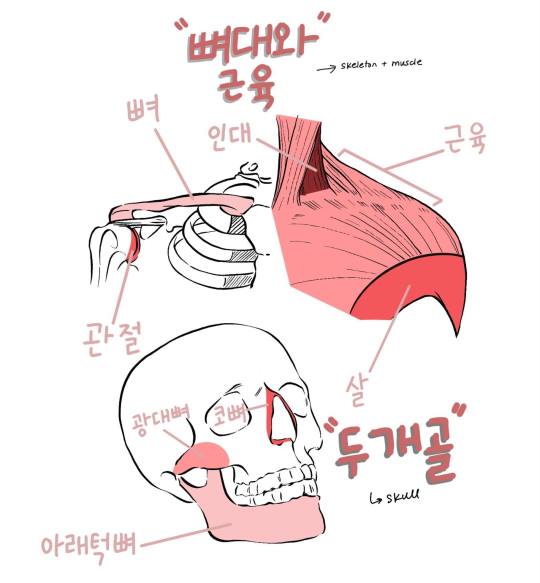
*picture is of a chest (half skeleton, half muscle) and a skull (necessary vocabulary is highlighted)
뼈대 - skeleton
skeleton can also be translated as: 해골 and 골격
major differences between 뼈대, 해골, and 골격: 뼈대 and 해골 are the most similar. Sometimes 해골 can refer to only the skull (see skull for a better understanding) - both of these refer to dead skeletons. However, 해골 comes from 한자 ‘骸骨’. The word 골격 also comes from 한자 meaning 骨格 (frame, figure) or 骨骼 (skeleton).
근육 - muscle
뼈 - bone
인대 - ligament
살 - flesh (not skin, but the ‘meaty-like’ part; almost like fat)
관절 - joint
두개골 / 해골 - skull
major difference between 두개골 and 해골: both come from 한자 ( 두개골 = 頭蓋骨 // 해골 = 骸骨), however, 해골 (according to a Korean native speaker), refers to the picture of a skull. Whereas 두개골 refers to the actual, physical skull.
광대뼈 - cheekbone
아래턱뼈 - mandible (jaw)
코뼈 - nasal bone
Example Sentences:
다행히 뼈에는 이상이 없나요 - Fortunately, there is nothing wrong with the bone (the bone is alright/not broken).
우리 오빠는 축구를 하다 인대가 늘어났어요 - My brother pulled a ligament while playing soccer.

*picture is of an eye and a pair of lips with blemishes (necessary vocabulary is highlighted)
피부 - skin
여드름 - pimple / zit
기미 / 주근깨 - freckles
major difference between 기미 and 주근깨: 기미 refers to spots you get from the sun (not usually pleasant) while 주근깨 translated to actual freckles
다래끼 - sty
수염 - facial hair (this can be a mustache or beard)
애교 살 - the fatty pocket under the eyes
다크서클 - dark circles
점 - mole, spot
흉터 / 흠 - a scar, blemish
major difference between 흉터 and 흠: 흉터 refers to an actual scar made a long time ago whereas 흠 considers all types of blemishes or flaws on the skin
not to be confused with 상처 (injury/wound that JUST happened) and 멍자국 (bruise)
입슬허피스 / 입슬의 발진 - cold-sore
difference: 입슬허피스 = lip herpes VS 입슬의 발진 = lip rash
Example Sentences:
여드름을 짜다가 세균에 감염될 수도 있어요 - If you pop your pimples, you might spread germs.
저는 작녀에 얼굴에 있는 점들을 뺐어요 - I had a few moles removed.
Extra Vocab to Know:
주름(살) - wrinkles / crease
혹 - bump / lump
땀 - sweat
눈곱 - sleep (the goop in your eye when you wake up; eye boogies)
하품(하다) - sigh (to sigh)
방귀 - fart
트림(하다) - burp (to burp)
소름 - goosebumps / goose pimples
딸꾹질(하다) - hiccup (to hiccup)
I received an ask last night asking about the word for ‘throat’. You could use 목 to describe your throat but a more technical term would be 목구멍. However, this isn’t used as often. For example:
목이 아프다 - a sore throat
희주는 눈물에 목이 메였다 - tears clogged Hee-Ju’s throat
Hope that clears up some confusion!
Happy Learning :)
~ SK101
Part [one || two]
313 notes
·
View notes
Text
korean adverbs that don’t really translate
adverbs are words that come before a verb and describe the manner/time/frequency/place in which the verb is done. this is true for both korean and english.
the examples below are known as ‘adverbials’ - just like adverbs, except they are taken from existing verbs that then have -게 added to them. there are a few of these manner-describing adverbials in korean that don’t have direct equivalents in english, but they are really common so it’s good to know what they convey.
편하게 친구랑 만났어
direct translation - I met my friend comfortably
conveyed meaning - the speaker met with a friend in an easy manner, without hassle, they feel comfortable when meeting, a lowkey or chilled meeting.
맛있게 먹어요!
direct translation - eat deliciously!
conveyed meaning - the speaker is telling the listener to eat with a good appetite, to enjoy their meal fully.
재미있게 봐줘서 고마워
direct translation - thanks for watching enjoyably
conveyed meaning - the speaker is thanking the listener for enjoying something they watched. this is used a lot by idols on social media, like they acknowledge that their fans had fun watching their performance.
246 notes
·
View notes
Text
Since COVID I’ve noticed more Korean teachers posting lessons on Youtube. A lot of them have criminally low views so I thought I would provide some links as I think they would be useful to many of you.
While the lessons are mostly in Korean please don’t be put off. The teachers speak slowly and clearly so even low intermediate learners should have no problem understanding :)
아임달imdal Korean teacher
Grammar and vocab videos both TOPIK specific and more everyday content. Beginner through to high intermediate level. I really like all of the videos I have watched. In some of her videos she sets ‘homework’ and asks viewers to post in in the comments and she will personally mark it for you!
현명한 선택,知好樂
Mainly intermediate level grammar comparison videos (ie, what is the difference between similar grammar points). She takes requests from viewers.
10분한국어 10min Korean
As the channel name suggests most of her videos are around 10 minutes long. Predominately intermediate and advanced grammar lessons but she also has videos on hanja.
베이직 코리안 basic Korean
Beginner content from reading and pronouncing hangul through to basic grammar. Videos are in Korean but have English subtitles.
PARKSSEAM OK-KOREAN
Intermediate level. It seems like she goes through a whole textbook in her videos. There are also TOPIK writing videos.
2K notes
·
View notes
Text
Charts: Giving Commands
안녕! Hi everyone! I’m back with some more charts! These are going to show you how to give commands in Korean! I have some full-length lessons about this below, so you should check those out if you want to see some more examples and stuff!:
Level 1 / Lesson 6: -(으)세요 (Giving Commands / Asking Questions)
Level 2 / Lesson 5: Negative Commands
Here are the charts!
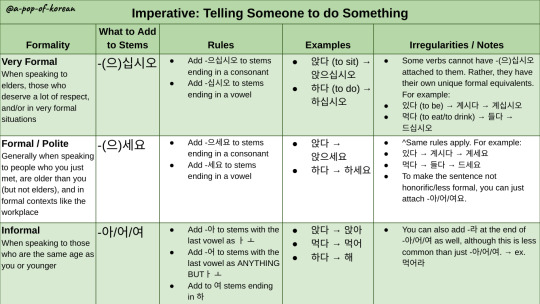
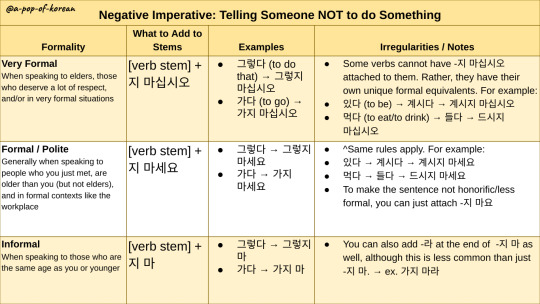
I hope these help y’all out! Let me know if you have any questions as always :)
If you want to practice writing and reading Korean with others, join my Discord chat here and my Tumblr chat here!
Want to expand your Korean vocabulary and get closer to fluency? Get Drops Premium using my affiliate link!
If you would like to donate and support my studies, check out my Ko-Fi! Thank you for your generosity! See you next time! 다음에 봐요!
186 notes
·
View notes
Note
Hi i want to start learning Korean and i was wondering if you could recommend me some free apps or books i could use or anything you think would be helpful?
Sure! I don’t know of any free books, but here are a few app recommendations:
Apps
- Eggbun (Language Learning)
- HiNative (Ask native speakers language questions)
- Tandem (Language Exchange)
- KBS Kong (Korean Radio. Good for listening practice)
- LingoDeer (Language Learning)
- Naver Dictionary (The best translator in my opinion. Also has some listening practice and sentence breakdowns)
- Webtoon (Korean Webtoon app. Great for reading practice)
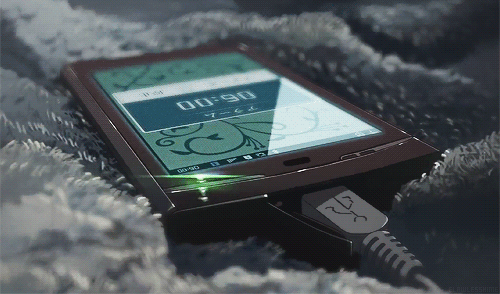
150 notes
·
View notes
Text
Conjunctions in Korean
사실 - Actually
그리고 - And, And then
왜냐하면 - Because
때문에 - Because of
그래도 - But still, Nonetheless, However
그런�� - By the way, So, But
하지만 - However, But
만약 - If, In case
그러면 - In that case, If so, Then
그렇지만 - One the other hand, However
아니면 - Or
그래서 - So, Therefore
그럼 - Then, Sure
그러니까 - Therefore, So
5K notes
·
View notes
Text
Useful Adverbs
Manner:
매우- very
아주- very
혼자- alone
함께- together
상당히- quite
진짜로- really
실제로- really
빨리- quickly
제대로- well
잘- well
열심히- hard
천천히- slowly
신중하게- carefully
거의- hardly
간신히- barely
가까스로- barely
주로- mostly
전적으로- absolutely
Time:
오늘- today
어제- yesterday
내일- tomorrow
매일- everyday
지금- now
그때- then
나중에- later
후에- later
바로- immediately
즉시- immediately
곧- soon
이미- already
최근에- recently
요즘- recently, these days, lately
아직(도)- still, yet
전에- ago
다음- next
지난- last
Frequency:
절대- never
드물게- rarely
가끔- sometimes
보통- usually
대개- usually
항상- always
늘- always
자주- frequently
흔히- frequently
Place:
여기- here
저기- there, over there
거기- there
저쪽에- over there
모든곳- everywhere
어디나- everywhere
어디든- anywhere
아무데나- anywhere
아무데도- nowhere
어디에도- nowhere
떨어져- away
바깥에- out (out there)
–Ana

5K notes
·
View notes
Text
I’m ______ing — -고 있다, -아/어 있다, -는 중이다
ㅈIn English, we use the progressive tense very commonly, and it’s just as useful in Korean. The progressive tense is used any time you want to indicate that an action or state is ongoing. For example:
I’m going to the store.
He is eating an apple.
Of course, it can be used in more than just the present tense. We also have past progressive:
I was doing my homework.
He was reading a book.
And we have future progressive as well:
I will be cooking dinner.
They will be taking a test.
So how do we make these kinds of sentences in Korean? There are a few simple ways.
Simple present tense
Unlike in English, simple present tense in Korean can sometimes be read with a progressive meaning. Simply conjugate your verb in whatever formality level you see fit in the present tense, and you’re done! For example:
A: 뭐 해? (What are you doing?)
B: 난 학교에 가. (I’m going to school.)
In this short dialogue, we have two verbs conjugated in low-formality 해체/반말 in the simple present tense, but we can read them as progressive.
A: 뭘 먹어요? (What are you eating?)
B: 사과를 먹어요. (I’m eating an apple.)
Again, we have simple present tense, but in mid-formality 해요체.
Simple present tense as progressive is commonly used when, as seen above, someone asks what someone else is doing.
-고 있다
-고 있다 is the most commonly used way to form progressive sentences to indicate that an action is ongoing. Simply add -고 있다 to the root of the verb and conjugate 있다 as normal.
PAST:
그림을 그리고 있었어요. (I was drawing a picture.)
수빈이는 뭘 읽고 있었어요? (What was Subin reading?)
PRESENT:
아기는 울고 있어요. (The baby is crying.)
세원 씨는 일하고 있어요? (Is Sewon working?)
FUTURE:
다음 주 이 때쯤 전 부산으로 운전하고 있을 거예요. (This time next week, I will be driving to Busan.)
수원 씨는 2년 후에 선생님으로 일하고 있을 거예요. (In two years, Suwon will be working as a teacher.)
-아/어 있다
-아/어 있다 is used to indicate that a state is ongoing. Rather than someone or something actively doing something, that person or thing is continuously existing in a particular state.
PAST
맨 뒷자리에 앉아 있었어요. (I was sitting in the far back seat.)
한 시간 안에 소주 5병을 다 마셔버린 수훈 씨는 밤 내내 엄청 취해 있었어요. (Suhun, who had drunk five bottles of soju within an hour, was extremely drunk all night.
PRESENT
친구는 거기서 서 있어요. (My friend is standing there.)
이웃사람이 이사가서 저 집은 비어 있어요. (My neighbors moved, so that house is empty.)
FUTURE
성수기니까 호텔들이 다 가득 차 있을 거예요. (Because it’s peak season, all the hotels will be packed full.)
10월말까지 저 산촌은 눈으로 덮여 있을 거예요. (That mountain village will be covered by snow by the end of October.)
-는 중이다
This grammatical form literally means “to be in the middle of” something. Simply attach it to the root of your action verb of choice!
PAST
어머니께서 전화하셨을 때 저는 청소하는 중이었어요. (When mother called, I was in the middle of cleaning.)
승진 씨가 저한테 숙제 좀 도와달라고 부탁했는데 저는 이미 다른 친구 만나러 가는 중이었어요. (Seungjin asked me for help with homework, but I was already on my way to meet another friend.)
PRESENT
저는 집에 가는 중이에요. (I am going home [I am in the middle of going home].)
수빈 씨는 숙제를 하는 중이에요. (Subin is in the middle of doing her homework.)
FUTURE
11시니 찬웅이는 오는 중일 거야. (It’s 11, so Chanwoong will be [in the middle of] coming.)
그때쯤 그 사람은 점심을 먹는 중일 거예요. (About that time, that person will be eating lunch.)
As always, thanks for reading, and happy studying~
2K notes
·
View notes
Text
Korean ღ sentence structure
☾ WHO + WHEN + WHERE + WHAT + HOW + VERB
Examples :
저는 매일 학교에 가요.
저 : I (”who?”)
매일 : everyday (”when?”)
학교 : school (”where?”)
가요 : go (verb)
↬ I go to school every day.
저는 지금 집에서 숙제를 해요.
저 : I (”who?”)
지금 : now (”when?”)
집 : home(”where?”)
숙제 : homework (”what?)
해요 : do (verb)
↬ I’m doing my homework at home now.
저는 내일 학교에서 한국어를 열심히 공부할거예요.
저 : I (”who?”)
내일 : everyday (”when?”)
학교 : school (”where?”)
한국어 : Korean (”what?”)
열심히 : hard (”how?”)
공부할거예요 : will study (verb)
↬ I will study Korean hard at school tomorrow.
제 아버지는 저녁에 집안에서 TV를 봤어요.
제 아버지 : My father (”who?”)
저녁 : evening (”when?”)
집안 : inside the house (”where?”)
TV : TV (”what?”)
봤어요 : watched/saw (verb)
↬ My father watched TV in the house in the evening.
우체국에 갔어요.
우체국 : post office (”where?”)
갔어요 : did go/went (verb)
↬ I went to the post office.
Sources :
pinterest.com
294 notes
·
View notes
Link
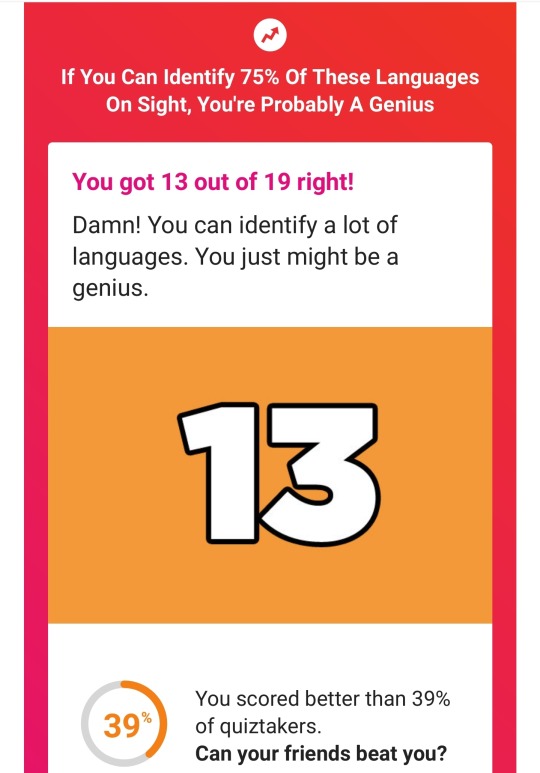
Buzzfeed says “if you can get at least 12 correct, you’re probably a genius.”
Well, I think Langblr can get twelve, easily :P
47K notes
·
View notes
Text









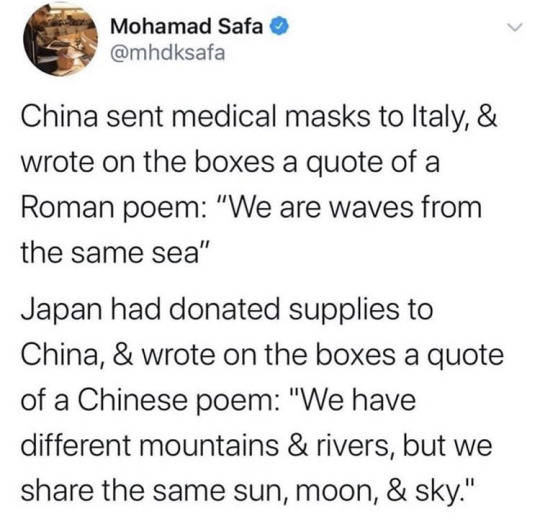
More uplifting news during this outbreak ♥️
154K notes
·
View notes
Text
TTMIK - 30 Essential Irregular Verbs
This list is a physical list of TTMIK’s “Learn Korean - 30 Essential Korean Irregular Verbs”. All rights are reserved to TTMIK and their team for creating this list! Go here for the PDF version!
1. 돕다 - to help
~ 도와요 - I help
~ 도와 주세요 - Please help me
2. 어렵다 - to be difficult
~ 어려워요 - it’s difficult
~ 이 문제 너무 어려워요 - this questions is too difficult
3. 쉽다 - to be easy
~ 쉬워요 - it’s easy
~ 이거 너무 쉬워요? - is it too easy?
4. 춥다 - to be cold
~ 추워요 - it’s cold
~ 오늘 정말 추워요 - it’s so cold today
5. 덥다 - to be hot
~ 더워요 - it’s hot
~ 밖에 많이 더워요? - is it very hot outside?
6. 눕다 - to lie down
~ 누워요 - I lie down
~ 이 침대에 누우세요 - lie down on the bed
7. 굽다 - to bake / roast
~ 구워요 - I bake
~ 같이 빵 구울래요? - do you want to bake some bread together?
8. 맵다 - to be spicy
~ 매워요 - it’s spicy
~ 매워서 못 먹겠어요 - I can’t eat it because it’s spicy
9. 아름답다 - to be beautiful
~ 아름다워요 - it’s beautiful
~ 와! 꽃이 정말 아름다워요 - wow! the flowers are so beautiful
10. 귀엽다 - to be cute
~ 귀여워요 - it’s cute
~ 아기가 정말 귀여워요! - the baby is so cute!
11. 고르다 - to choose
~ 골라요 - I choose
~ 하나만 골라요 - just choose one
12. 다르다 - to be different
~ 달라요 - it’s different
~ 그 두 사람은 정말 달라요 - those two people are really different
13. 모르다 - to not know
~ 몰라요 - I don’t know
~ 누가 했는지 저는 몰라요 - I don’t know who did it
14. 빠르다 - to be fast
~ 빨라요 - it’s fast
~ 비행기가 가장 빨라요 - airplanes are the fastest
15. 자르다 - to cut
~ 잘라요 - I cut
~ 이거 좀 잘라 주세요 - please cut this
16. 기르다 - to grow
~ 길러요 - I grow
~ 저는 허브를 길러요 - I grow herbs
17. 게으르다 - to be lazy
~ 게을러요 - I’m lazy
~ 제 남동생은 너무 게을러요 - my little brother is very lazy
18. 노르다 - to press
~ 놀러요 - I press
~ 이 버튼을 누르세요 - press this button
19. 듣다 - to listen
~ 들어요 - I listen
~ 제 말 좀 들어 보세요 - please listen to me
20. 걷다 - to walk
~ 걸어요 - I walk
~ 저는 학교에 걸어가요 - I walk to school
21. 묻다 - to ask
~ 물어요 - I ask
~ 무엇이든지 물어보세요 - please ask me anything
22. 싣다 - to load
~ 실어요 - I load
~ 짐 다 실었어요 - did you finish loading the luggage?
23. 낫다 - to recover / get well
~ 나아요 - I get well
~ 푹 쉬고 얼른 나아요 - Get lots of rest and get well soon
24. 잇다 - to connect
~ 이어요 - I connect
~ 이 두 점을 이어요 - connect these two dots
25. 짓다 - to build
~ 지어요 - I build
~ 이 집은 제가 직접 지었어요 - I built this how by myself
26. 붓다 - to pour
~ 부어요 - I pour
~ 이제 물을 한 컵 부어요 - now, pour a cup of water
27. 긋다 - to draw (a line)
~ 그어요 - I draw (a line)
~ 여기에 선을 그어 부세요 - try drawing a line here
28. 파랗다 - to be blue
~ 파래요 - it’s blue
~ 하늘이 정말 파래요 - the sky is really blue
29. 까맣다 - to be black
~ 까매요 - it’s black
~ 옷 색깔이 다 까매요 - the clothes are all black
30. 이렇다 - to be like this
~ 이래요 - it’s like this
~ 항상 이래요 - it’s always like this!
part 1
Happy Learning :)
~ SK101
321 notes
·
View notes
Text
TTMIK - 30 Essential Korean Adjectives for Beginners
This list is courtesy of TTMIK’s “Learn 30 Essential Korean Adjectives for Beginners”. All rights reserved to TTMIK and their team for creating this list - this is only a physical copy or their list, it is not my own. Go here for the PDF copy.
How to attach adjectives to a noun:
If there is no 받침? attach -ㄴ (ex. 크 (from 크다 - to be big) + ㄴ = 큰)
If there is 받침? attach -은 (ex. 작 (from 작다 - to be small) + 은 = 작은)
this does not apply for irregular verbs**
1. 크다 - to be big
~ 커요 - it’s big
~ 큰 - big
~ 큰 나무 - big tree
2. 작다 - to be small
~ 작아요 - it’s small
~ 작은 - small
~ 작은 사과 - small apple
3. 멀다 - to be far
~ 멀어요 - it’s far
~ 먼 - far
~ 먼 거리 - far distance
4. 가깝다 - to be close / nearby
~ 가까워요 - it’s close
~ 가까운 - close
~ 가까운 은행 - nearby bank
5. 쉽다 - to be easy
~ 쉬워요 - it’s easy
~ 쉬운 - easy
~ 쉬운 문제 - easy problem
6. 어렵다 - to be difficult
~ 어려워요 - it’s difficult
~ 어려운 - difficult
~ 어려운 시험 - difficult exam
7. 춥다 - to be cold
~ 추워요 - it’s cold
~ 추운 - cold
~ 추운 겨울 - cold winter
8. 덥다 - to be hot (weather)
~ 더워요 - it’s hot
~ 더운 - hot
~ 더운 여름 - hot summer
9. 귀엽다 - to be cute
~ 귀여워요 - it’s cute
~ 귀여운 - cute
~ 귀여운 강아지 - cute puppy
10. 좁다 - to be narrow
~ 좁아요 - it’s narrow
~ 좁은 - narrow
~ 좁은 길 - narrow road
11. 넓다 - to be large
~ 넓어요 - it’s large
~ 넓은 - large
~ 넓은 집 - large house
12. 늦다 - to be late
~ 늦어요 - it’s late
~ 늦은 - late
~ 늦은 시간 - late time
13. 싸다 - to be cheap
~ 싸요 - it’s cheap
~ 싼 - cheap
~ 싼 가격 - cheap price
14. 비싸다 - to be expensive
~ 비싸요 - it’s expensive
~ 비싼 - expensive
~ 비싼 자동차 - expensive car
15. 아프다 - to be sick / hurt
~ 아파요 - it’s sick
~ 아픈 - sick
~ 아픈 사람 - sick person
16. 느리다 - to be slow
~ 느려요 - it’s slow
~ 느린 - slow
~ 느린 속도 - slow speed
17. 빠르다 - to be fast
~ 빨라요 - it’s fast
~ 빠른 - fast
~ 빠른 결정 - fast decision
18. 같다 - to be the same
~ 같아요 - it’s the same
~ 같은 - same
~ 같은 색깔 - same colour
19. 예쁘다 - to be pretty
~ 예뻐요 - it’s pretty
~ 예쁜 - pretty
~ 예쁜 아이 - pretty child
20. 좋다 - to be good
~ 좋아요 - it’s good
~ 좋은 - good
~ 좋은 생각 - good idea
21. 많다 - to be a lot
~ 많아요 - it’s a lot
~ 많은 - a lot
~ 많은 사람들 - a lot of people
22. 적다 - to be few / a little
~ 적어요 - there’s a few / a little
~ 적은 - few / a little
~ 적은 양 - little amount
23. 얇다 - to be thin
~ 얇아요 - it’s thin
~ 얇은 - thin
~ 얇은 종이 - thin paper
24. 두껍다 - to be thick
~ 두꺼워요 - it’s thick
~ 두꺼운 - thick
~ 두꺼운 양말 - thick socks
25. 깨끗하다 - to be clean
~ 깨끗해요 - it’s clean
~ 깨끗한 - clean
~ 깨끗한 물 - clean water
26. 더럽다 - to be dirty
~ 더러워요 - it’s dirty
~ 더러운 - dirty
~ ��러운 옷 - dirty clothes
27. 밝다 - to be bright
~ 밝아요 - it’s bright
~ 밝은 -bright
~ 밝은 달 - bright moon
28. 어둡다 - to be dark
~ 어두워요 - it’s dark
~ 어두운 - dark
~ 어두운 밤 - dark night
29. 길다 - to be long
~ 길어요 - it’s long
~ 긴 - long
~ 긴 목 - long neck
30. 짧다 - to be short
~ 짧아요 - it’s short
~ 짧은 - short
~ 짧은 손가락 - short fingers
part 1 || part 2
Happy Learning :)
~ SK101
#korean#korean language#korean language blog#korean langblr#korean blog#kblr#studykorean101#sk101#korean tumblr#learn korean#study korean#studying korean#learning korean#korean vocab#korean gram#korean adjectives
382 notes
·
View notes
Text
German Loan-Words In Korean
여러분 안녕하세요!
Yes I am still alive. I have been - and still am - dealing with things in Real Life that take up all my energy (namely depression and anxieties), but I wanted to make this post because it was something I stumbled over. Loan words. Many languages - maybe even all I don’t know - have loan words from other languages. Korean is no exception. We often hear the english ones because most of us know English a whole lot better than other languages unless your native language is another one.
As you may know I’m German. So when I stumbled over two words that sounded very familiar to me - because they were pretty much German but with Korean pronunciation - I had to look up more German loan words and found a page in the wiktionary. So I wanted to share these words with you from the perspective of a German.
Many of these are chemical elements or city names, but also has some that are not, I will keep them all in though, just to be complete.
Let’s go! 가자!
ㄱ
가톨릭 - Catholicism - German: Katholik
갈륨 - gallium - German: Gallium - chemical element
게놈 - genom - German: Genom - complete genetic information of an organism
게르마늄 - germanium - German: Germanium - chemical element
그라프 - graph - German: Graph
그람 - gram - German: Gramm - Unit of measurement
깁스 - cast - German: Gips - cast for a broken bone
ㄴ
나치 - Nazi - German: Nazi
나트륨 - sodium - German: Natrium - chemical element
노이로제 - neurosis - German: Neurose
ㄷ
도이췰란드 - Germany - German: Deutschland - This seems to be obsolete in South Korea, they now use 독일 but according to the wiktionary it’s still used in North Korea
ㄹ
뢴트겐 - X-Ray - German: Röntgen
루페 - Magnifying glass - German: Lupe
리히텐슈타인 - Liechtenstein - German: Liechtenstein - A country in Europe
ㅁ
망간 - manganese - German: Mangan - chemical element
뮌헨 - Munich - German: München - City in Germany.
메스 - scalpel - German: Messer (Messer is the word for knife) - This is one noted as being dutch in origin but as it is so similar to the German word I am including it
ㅂ
베른 - Bern - German: Bern - Capital of Switzerland
베를린 - Berlin - German: Berlin - Capital of Germany
벤졸 - benzene - German: Benzol - chemical compound
본 - Bonn - German: Bonn - German City
빈 - Vienna - German: Wien - Capital of Austria
ㅅ
슈니첼 - schnitzel - German: Schnitzel - A food
ㅇ
아르바이트 - Part-Time Job, Side Job, German: Arbeit - Any kind of work full time, part time, chores, a task, hobby etc.
알레르기 - allergy - German: Allergie
에네르기 - energy - German: Energie
에스체트 - eszett - German: Eszett - the letter ß
왈츠 - waltz - German: Walzer - a dance
요오드 - iodine - Germany: Jod
요한 - John - German: Johann - a name
이데올로기 - ideology - German: Ideologie
ㅊ
취리히 - Zurich - German: Zürich - City in Switzerland
ㅋ
칼륨 - potassium - German: Kalium - chemical element
코크스 - coke - German: Koks - coal product
쾰른 - cologne - German: Köln - City in Germany
크롬 - chromium/chrome - German: Chrom
크바르크 - quark/cottage cheese - German: Quark
크세논 - xenon - German: Xenon - chemical element
ㅌ
테마 - topic/theme - German: Thema
ㅍ
페스트 - plague - German: Pest
프로 / 퍼센트 - percent - German: Prozent - %
플루오르 - fluorine - German: Flour - chemical element
ㅎ
호프 - bar/pub - German: Hofbräu (in German this is a certain kind of beer)
So if you are German or know some German maybe these can help you to remember these words more easily. While not all of them will be useful in everyday life, some may be. And if you wonder if Korean has any words from your language in their vocabulary, check out this page.
Thank you all for still being here and learning with me, even if I am quiet for a while. More coming soon I hope! :)
Until then. Stay awesome! 화이팅
38 notes
·
View notes

